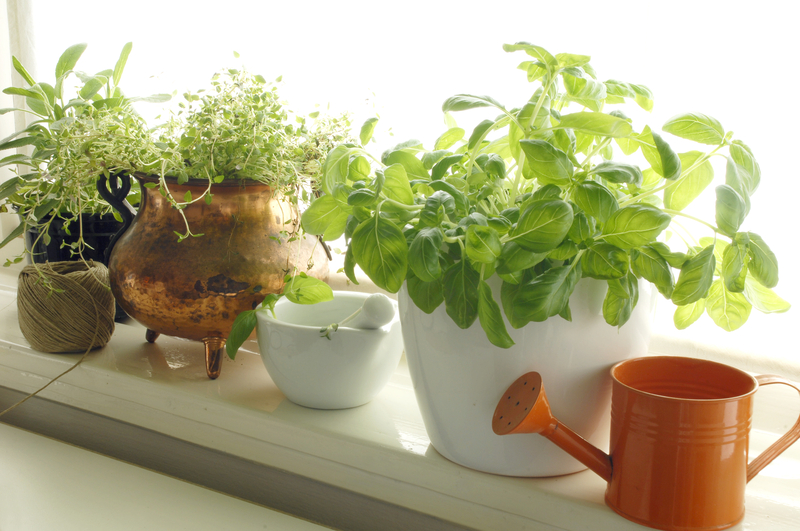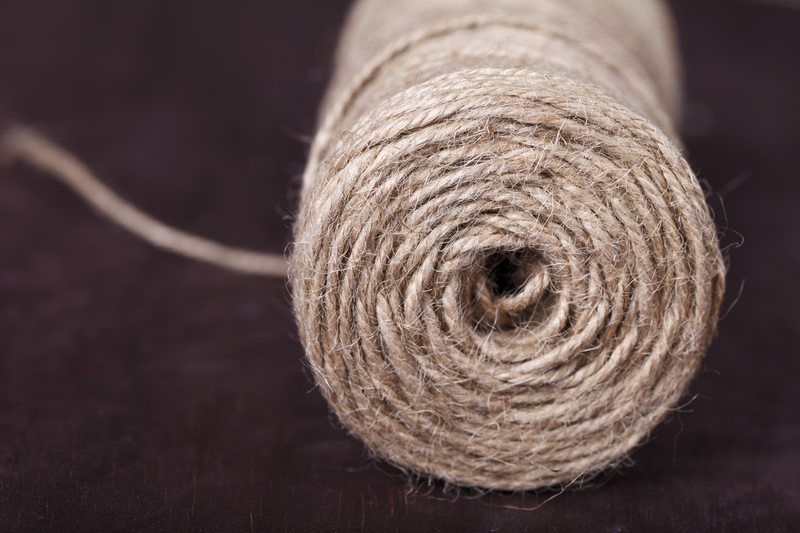Herb Gardening Made Simple
Posted on 25/06/2025
Herb Gardening Made Simple: A Comprehensive Guide for Beginners
Herb gardening is a rewarding and enjoyable way to connect with nature, enhance your home-cooked meals, and add vibrant greenery to your living space. Whether you have a sprawling backyard or a sunny windowsill, you can easily grow fresh herbs at home. In this comprehensive guide, we will break down the essentials of herb gardening in simple, actionable steps to make your green thumb journey seamless and successful.
Why Start a Home Herb Garden?
There are myriad reasons to grow your own herbs. Not only do they offer fresh flavors for your culinary creations, but they also provide medicinal benefits, aromatic enjoyment, and natural beauty to your home. Here are some compelling reasons to dive into the world of herb gardening:
- Cost-effective: Reduce grocery expenses by having a steady supply of fresh herbs at your fingertips.
- Healthier choices: Enjoy organic, pesticide-free produce.
- Therapeutic experience: Gardening has been shown to reduce stress and improve mood.
- Environmental benefits: Enhance pollinator habitats and reduce your carbon footprint.
- Convenience: Harvest herbs just steps away from your kitchen.

Essential Steps to Starting Your First Herb Garden
Let's simplify the process! Here is a step-by-step guide to get you well on your way to a flourishing herb garden.
1. Decide Where to Grow Your Herbs
- Outdoor Herb Gardening: Best for those with a yard, balcony, or patio. Choose a spot that gets at least 6 hours of sunlight daily.
- Indoor Herb Gardens: Perfect for small spaces. A sunny windowsill that faces south or west is ideal for most herbs.
Tip: Herbs like basil, thyme, and rosemary require plenty of sunlight. However, varieties like mint and parsley tolerate partial shade.
2. Choose Your Herbs Wisely
When starting, opt for easier-to-grow herbs. Here is a list of beginner-friendly herbs that thrive in most conditions:
- Basil - Great for Italian dishes; loves warmth and sunshine.
- Mint - Vigorous and aromatic; best grown in pots to prevent spreading.
- Chives - Mild onion flavor; a hardy perennial that's easy to maintain.
- Parsley - Biennial herb with vibrant leaves, rich in nutrients.
- Rosemary - Woody perennial; drought-tolerant and fragrant.
- Oregano - Excellent for Mediterranean recipes; thrives in full sun.
- Cilantro - Fast-growing annual; best sown from seed each season.
- Thyme - Perennial, low-maintenance, and robust flavor.
3. Pick the Right Containers or Beds
- In the Ground: Amend soil with compost to improve drainage and fertility.
- Raised Beds: Provide excellent drainage and reduce weeds.
- Pots & Containers: Ensure pots have drainage holes. Terracotta or ceramic are ideal for airflow.
Container gardening is especially popular for indoor herb gardening due to its versatility and ease of access.
4. Use Quality Soil
Herbs prefer light, well-draining soil. For pots, use a high-quality potting mix. For garden beds, enrich soil with aged compost. Avoid dense, clay-heavy soils, as they retain too much water and can rot roots.
5. Planting and Spacing
- Seeds: Read the seed packet for depth and spacing instructions. Most herb seeds are sown 1/8 to 1/4 inch deep.
- Transplants: Gently remove plant from nursery container, loosen roots, and plant at the same depth.
- Spacing: Give each herb proper space for air circulation. Typically, 6-12 inches apart is sufficient.
6. Watering Your Herb Garden
Overwatering is a common mistake among herb growers. Most herbs prefer to dry out somewhat between waterings. Water deeply but infrequently--typically once the top inch of soil is dry.
- Tip for containers: Check more frequently, as pots dry out faster than garden beds.
7. Feeding and Fertilizing
Herbs are less demanding than other plants when it comes to fertilizer. Use a balanced organic fertilizer or a light top-dressing of compost every 4-6 weeks during the growing season. Overfeeding can reduce flavor intensity.
Herb Gardening Tips for Maximum Success
Pruning and Harvesting
Regular harvesting encourages herbs to branch out and grow bushier. For leafy herbs like basil and mint, pinch stems above leaf nodes to promote new growth. Never harvest more than one-third of the plant at a time.
Dealing with Pests and Diseases
- Prevention: Healthy plants resist pests better. Give herbs plenty of sunlight and air flow.
- Solutions: Remove pests by hand or use organic controls like neem oil or insecticidal soap.
- Common issues: Aphids, spider mites, and fungal diseases can be deterred with proper care.
Winter Care for Herb Gardens
Some herbs, like rosemary and thyme, are perennial and can survive mild winters. For harsher climates, move containers indoors or propagate cuttings to overwinter on a sunny sill.
Succession Planting
For herbs with quick turnover like cilantro and basil, sow new seeds every few weeks for a continuous supply.
The Best Herbs to Grow Indoors All Year Round
- Basil (requires plenty of light and warmth)
- Chives (thrives on a sunny windowsill)
- Mint (prefers partial sunlight)
- Parsley (does well with moderate light)
- Thyme (adaptable and hardy indoors)
- Rosemary (altitude to drought makes it ideal for indoor pots)
Creative Ideas to Use Your Homegrown Herbs
In the Kitchen
- Add chopped basil or parsley to pasta, salad, or omelets for fresh flavor.
- Make mint tea or mojitos with freshly harvested mint.
- Infuse oils or vinegars with thyme, rosemary, or oregano.
For Wellness and Beauty
- Create herbal sachets with lavender, rosemary, or sage for aromatherapy.
- Make skin-soothing balms using calendula and chamomile.
- Steep fresh lemon balm for a calming bedtime tea.
For Home and Garden
- Repel insects naturally with pots of basil, mint, or lavender on your patio.
- Use dried herbs in homemade candles or potpourri.
- Create edible herb wreaths for decorative gifting.
Common Questions About Herb Gardening
Can I start an indoor herb garden without natural sunlight?
Yes! Although most herbs love sunlight, you can supplement with LED or fluorescent grow lights. Aim for at least 12-16 hours of light per day for optimal growth.
How can I prevent my herbs from getting leggy?
Legginess (tall, spindly growth) is a sign of insufficient light. Move your herb garden to a brighter location or use grow lights, and regularly pinch or prune to encourage bushiness.
Should I use seeds or starter plants?
Both are valid options. Seeds are economical but require patience. Starter plants offer a quicker harvest. Many beginners find it easier to start with seedlings from a nursery or garden center.
How often should I replace my herbs?
Annual herbs like basil and cilantro complete their life cycle each year and need replanting. Perennials like chives, rosemary, and thyme can live for years with proper care.
Best Practices for Sustainable Herb Gardening
- Use organic potting soil and fertilizers to avoid chemical runoff.
- Compost herb trimmings for a closed-loop garden system.
- Rotate pots and refresh soil annually to prevent disease buildup.
- Encourage pollinators by allowing some herbs to flower.

Expand Your Herb Garden: Advanced Tips
Companion Planting
Many herbs repel pests or improve growth in neighboring plants. For example, basil is believed to boost tomato yield, while chives deter aphids from leafy greens.
Preserving Your Herb Harvest
- Drying: Air dry or use a dehydrator for herbs like oregano, sage, and thyme.
- Freezing: Chop herbs and freeze in ice cube trays with water or olive oil for long-term use.
- Infusing: Steep fresh herbs in oils or vinegars to create flavorful infusions.
Grow Unusual or Exotic Herbs
- Lemongrass for Asian cuisine.
- Sorrel or shiso for unique flavors.
- Stevia as a natural sweetener.
- Curry leaf for authentic Indian recipes.
Conclusion: Start Your Herb Garden Today!
Herb gardening made simple is more than just a slogan--it's a reality anyone can enjoy. With minimal investment, a little knowledge, and regular care, you can grow fresh herbs at home year-round. From boosting your culinary repertoire to improving air quality and mental well-being, an easy herb garden is a fruitful endeavor for all ages.
Ready to get your hands dirty? Start small, experiment, and savor the countless rewards of herb gardening. Your journey to greener, fresher living begins with a single plant!
Happy Planting!
Latest Posts
The First Steps to Rejuvenating a Neglected Yard
Making Your Garden a Kid's Wonderworld
Gardening Tips for Harmonizing with Your Dog
Weatherproofing Your Garden from Severe Damage
Transforming Our Planet: Gardening's Impact on Climate Change

